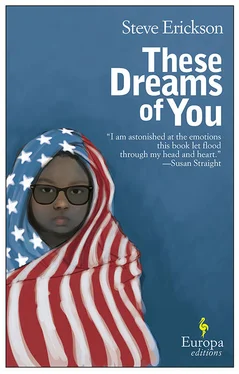The day after she visits Sheba’s family, the driver takes Viv deeper into the city than she’s been. The Entoto Hills loom to the north. Taxis blue and white like the umbrellas around the hotel pool fill the roads, and a plume of smoke rises from the Meskel Square where Viv sees a burning pyramid. They’ve been driving half an hour when they park the car in a neighborhood at the city’s center. The driver leads Viv by foot down a series of winding, narrow stone steps into a labyrinth of tunnels and bridges, lined by high walls covered with moss, to the deepest root of the eucalyptopolis.
A sirocco blows in from the moon. Viv hears the mournful songs of the nearby mosques. As the woman with the turquoise hair follows the driver, watched by Ethiopians in the distance, the walls of the passages resonate with distant chants and the thunder of a gathering storm.
To the south, Viv glimpses an ancient underground church carved from rock, bubbling up out of an earth radiant with three thousand millennia, the oldest place that human-time remembers, barely. Around her, she feels the monsoon of the storm above and the Nile-saturated ground below yearn for each other; the woman and driver pass inviolate stone corners still smelling of the mustard gas with which Mussolini’s army massacred a million Ethiopians seventy years ago. The passage is crisscrossed by alleys where people in white gauze float in and out of the shadows.
The trip is so clandestine and mysterious that it can’t help seeming as though Sheba’s mother should be waiting at the end of wherever it leads; but finally Viv stops the driver. “No,” she says, “this isn’t right,” and looks over her shoulder behind her, with no idea where she’s come from.
Standing in the doorway of the Bloomsbury hotel room, the young African woman wears across her shoulders the same scarf that covered her head when they first saw her yesterday outside the pub. Otherwise, the jeans make her look like any contemporary western woman. “Hello,” says Zan.
“Hello,” the young woman nods, “I’m Molly,” pulling the scarf from her shoulders and rolling it and slipping it into the bag she carries under one arm. “I understand you are looking for a caretaker for the children.”
Startled, Zan says, “Come in.” Sheba has said nothing, the young woman locked in her focus, but now blurts, “Have you ever had any little girls in your tummy?”
“I think she wants to know,” says Zan, “if you have children of your own. A daughter she can be friends with, maybe,” but he’s not sure that’s what Sheba really means. “Sheba, go play with Parker,” he says.
Still gluing and painting his creatures they bought in Covent Garden, Parker says, “She can’t play what I’m playing.” Sheba starts to cry; Zan closes his eyes. It occurs to him maybe Viv is right and the young African woman might be offended by the name Sheba. Would they call an adopted Mexican child Montezuma? “Parker,” Zan says as calmly as he can, “help me out. Do something your sister can too, or find something on TV.”
Molly kneels to Sheba’s level and says to the girl, “Let me talk with your father a moment, all right? Then perhaps you and I will play.” She rises and turns to Zan as the girl backs away still watching the woman. “I apologize for the intrusion of coming to the room. I tried to ring you earlier from where I’m staying but no one answered, and I don’t have a mobile.”
Like many of the small hotels in the area, this one has no telephones in the room, so Zan can’t be sure whether Molly means that she called the front desk downstairs or tried his cell, which hasn’t rung at all and which she wouldn’t have the number for anyway. While Parker was in the room gluing and painting, there was half an hour when Zan took Sheba to the little market around the corner, darting in and out of the rain, then down the street for a sandwich and the English butter cookies with which both of them have become mildly obsessed. At a newsstand, Zan bought a copy of a British music magazine with Sheba’s favorite artist on the cover, a retrospective. There was a call earlier on Zan’s cell from J. Willkie Brown that Zan didn’t answer and hasn’t returned.
A small table huddles in the corner of the room and Zan and the young woman sit down at it. On the table is a small pot for hot water and a small selection of teas. “Operative word, obviously,” Zan waves at the room, “is small.”
“Of course,” she smiles.
“Sheba and I sleep in the big bed,” he says, “and Parker has the small one. She hasn’t gotten to the point yet where she wants to sleep alone.”
“But she will,” Molly says.
“I keep reminding my wife that Parker was the same when he was younger. Never wanted to fall asleep alone. Then one night when he was nine or ten,” Zan snaps his fingers, “not only does he want to sleep alone, he barely wants his parents in the same house.” Zan is more rattled than he realizes by the news of the foreclosure. “Have you been in London long? I’m sorry,” he stops himself, “I shouldn’t assume—”
“No,” she says, “you’re quite correct, I am not from London.” She cocks her head in thought. “I’ve been here. . a short time.”
“Your English is excellent,” says Zan. “I hope that’s all right to say.”
Her accent is indeterminate — a bit British, a bit the singsong precision of an English by way of Africa, maybe a bit something harder, from some other corner of the world. “Thank you,” she says. “My mother spoke English so that’s what I spoke before I moved to Addis Ababa ten years ago.”
“Are you Ethiopian?” Zan says. He’s not sure how disquieted he is by this.
“Half,” she says. “My mother was born there but came to London as a small girl and grew up here.”
“And your father?”
“He may have been British but. . it is not as clear.”
“Sorry to pry.”
“It’s all right.”
“You grew up in England then. I didn’t think ‘Molly’ sounded African.”
“Actually I was born and raised in Germany. In Berlin.”
Over these few minutes the room has gradually, at first imperceptibly, filled with sound, as though frequencies are crossing, catching half a dozen musics from anywhere and everywhere. Zan still isn’t clear on the woman’s genealogy but says, “What are you doing here?” which doesn’t come out the way he intends. “I mean, in London.”
“So far I have been taking care of children,” indicating Parker and Zan, “sometimes I clean houses. . ” She shrugs. “I do what I need to and what I can.”
“Seriously, jerkwad?” Parker says to his sister. “I just spent like twelve hours gluing that! You don’t even know how to play this game.”
“Poppy!” Sheba wails.
Zan says, “Parker, I asked you to—”
“There’s nothing I want to do or watch or play with her,” Parker answers.
Zan indicates to Molly the hotel television. “It only gets half a dozen channels and nothing the kids care about.”
“I am certain it must be difficult for them in a strange country,” she says.
“I think they’re liking it,” though he doesn’t really think so at all.
“Not the dark place with the dummies or the place where the heads are cut off,” says Sheba.
“Very civilized children, then,” she jokes. “I have never been to your country,” she adds, “but my mother lived there, in the late Sixties and much of the Seventies, after leaving England.”
“Really?” says Zan. “Where?”
Читать дальше











